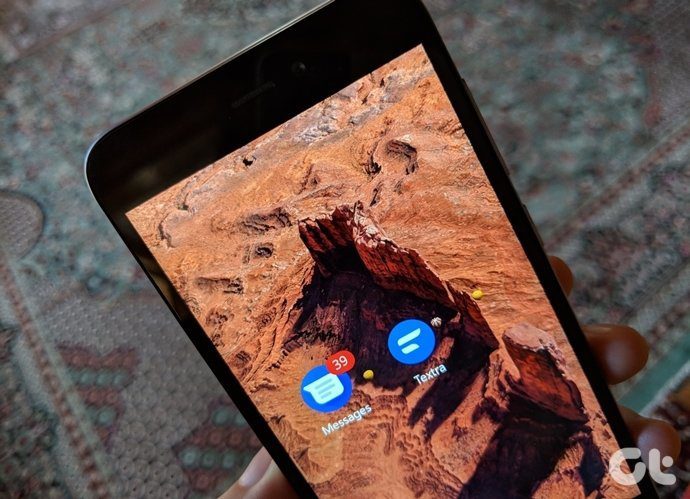Now, after more than a year of forcing Hangouts on users, Google has finally come out with a dedicated SMS app of their own called Messenger. Why would you want to have the Messenger app as your default? How is it better (or worse) than awesome third party SMS apps like GO SMS, Handcent, or Textra that we’ve talked about before? Read on to find out.
Messenger Looks Great
There are no two ways about it. For an SMS app from the company that gave us Android 3.0 Honeycomb (the one you’re not supposed to talk about), Messenger is a stunner. It follows Material Design closely. Everything from bright colors to animations to ripple effects to the big round floating action button is right there. One stand out feature in Messenger is how each conversation has a different accent color. If the contact you’re chatting with has a profile picture, the app will take the most dominant color from the picture. If there’s no profile picture, the app still assigns different colors to each conversation, albeit randomly.
But Messenger Is Limited
Unfortunately, like other apps Google creates, Messenger feels like a boilerplate. An app that has all the essentials and gets the basics right, but with room for third party apps to build upon. In Summation: If what you’re looking for is a stable, uncomplicated way to instant message, go ahead and download Google Messenger. But if you want anything more, you’ll have to look somewhere else.
The Case For Third Party SMS Clients
If you’re a heavy SMS user, you’re going to want more than just a pretty UI and different colored conversation views. Things like quick reply, favorites, do not disturb mode and themes become a big priority.
1. GO SMS Pro Is Still The King Of All Features
Go SMS Pro has been the go-to SMS app for years, even when it wasn’t that good to look at. Now, with version 6.0 it too has Material Design influences and it still carries all the great features that made it what it is today. You have a private conversation view, dual SIM support, themes, emojis and a lot more. While GO SMS Pro has a number of features, over the years it’s put on a bit of weight and has become bloated. Not to mention the ads. And unlocking it all takes an in-app purchase of $7. Important Update: TechCrunch reported about the GO SMS Pro app for Android carrying a bug that potentially exposes photos, videos, and other files on your phone. Till the developers release a proper update to fix the bug, we recommend moving to the default Messages app with Android RCS messaging or using the Microsoft SMS Organizer app.
2. Handcent Is The GO SMS Pro Without The Baggage
Handcent’s and GO SMS Pro’s feature sets are quite similar. It has the private SMS box, theme support, scheduling features and a lot more. The great thing is that unlike GO, Handcent is still completely free. There are no in-app purchases trying to con you into spending money you don’t really want to.
3. Textra Looks Just As Good As Messenger And Has Better Features
We’ve written about Textra in detail before. The gist is that Textra follows the Material Design language more closely than any other SMS app I’ve seen. It looks gorgeous. And thanks to the theme support, you can customize it as well. My favorite thing about Textra is the quick reply view. Instead of just showing the message and text input box, Textra shows the latest conversation, so you get context without ever jumping into the app itself. It has good features (although not as many as GO and Handcent), looks great, works well and is being actively developed.
4. Hello Is The Google Messenger Replacement
Hello is a minimal SMS app and if for some reason you don’t like Google Messenger but still prefer minimal features, Hello is for you. Hello has a great tabbed interface that allows you to quickly switch between conversations and the dark mode is pretty sweet as well. And of course, the app is completely ad free.
Which One Did You Choose?
Which SMS app did you go with? Let us know in the comments below. The above article may contain affiliate links which help support Guiding Tech. However, it does not affect our editorial integrity. The content remains unbiased and authentic.





















